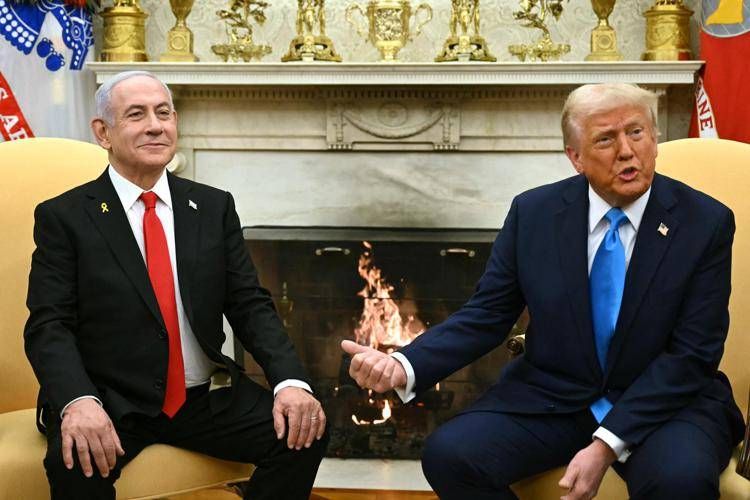
Trump and Netanyahu: shared strategy against Iran and the challenges of the Middle East
A crucial meeting between US President Donald Trump and Israeli Prime Minister Netanyahu marks new directions for regional policy and countering Iran. Between alliances, economic and diplomatic challenges, the forces at play could lead to a wider conflict
The recent meeting between the US President, Donald Trump, and the Israeli Prime Minister, Benjamin Netanyahu, was observed with particular attention by many world capitals. Netanyahu was the first foreign leader to meet Trump at the White House since ‘Liberation Day’, a meeting that raised questions not only about the future of US-Israeli relations, but also about possible developments in Middle East policy, particularly with respect to the Iranian issue.
Tensions with Iran: a common line between the US and Israel
During the meeting, Netanyahu reiterated the position of Tel Aviv and Washington, united in their goal of preventing Iran from acquiring nuclear weapons. Trump emphasised that although an agreement with Tehran would be preferable, the option of using military force remains on the table, although not desired. His administration has confirmed its intention to continue to exert maximum pressure on Iran, which supports jihadist groups such as Hamas, Hezbollah and the Houthis, being part of what is called the ‘Axis of Resistance’.
Coercive diplomacy: the American strategy and the Israeli position
Chuck Freilich, an expert at the Institute for National Security Studies (INSS), described Trump’s pressure as ‘coercive diplomacy’. Despite the harsh rhetoric, Freilich noted that Washington does not seem intent on engaging in a direct conflict with Tehran, but rather on pursuing an approach that aims to limit its influence without reaching a military confrontation.
Iran’s domestic context: fragility and regional threats
The Iranian regime, however, is experiencing a period of increasing instability. Raz Zimmt, an expert at the INSS, pointed out that Iran is going through a deep economic crisis, with inflation exceeding 40 per cent and a budget deficit that has exceeded the most critical levels since the war with Iraq in the 1980s. The domestic crisis comes on top of the difficult regional situation, with the collapse of Bashar al-Assad’s regime in Syria depriving Iran of a key strategic base for the projection of its influence.
Iran and the challenge of regime change
The crucial question concerns Iran’s ability to deal with these internal problems without undergoing regime change. Zimmt warned against thinking that the growing disillusionment of the Iranian population would automatically lead to the collapse of the government. The regime, although weakened, remains solid in its intentions to defend its survival, in particular through its nuclear programme, which is a guarantee for its long-term security.
The US and the need for continued involvement in the Middle East
Despite Trump’s earlier declaration that he wants to reduce US engagement in the Middle East, geopolitical realities have made this untenable. The conflict between Israel and the Axis of Resistance has driven Washington to maintain a strong involvement, particularly to support Israel and limit Iranian influence in the region. The decision to withdraw from the JCPoA (Iran Nuclear Deal) during the first Trump presidency was seen as a strategic mistake, but the US-Israeli relationship remains a constant in regional political dynamics.
The Palestinian issue and Trump’s peace plan
The Palestinian dossier remains a key element in the normalisation process between Israel and some Arab states, including Saudi Arabia. The Abraham Agreements, promoted during the Trump presidency, were an important step in this direction. However, the process is not without its obstacles, mainly due to Trump’s unacceptable position on Gaza and the Palestinian issue, which remains a point of friction with Arab and Muslim countries.
The future of the conflict with Iran and Israel’s strategy
Future developments will depend on the ability of the US to reach an understanding with Iran. Zimmt emphasised that despite the difficulties, the window for a negotiated settlement is rapidly closing. If no agreement is reached by the summer, the likelihood of a military confrontation between Israel, the US and Iran will increase significantly.
Israel, for its part, must consider three crucial factors before taking military action against Iran: the US consensus, Israeli operational capabilities, and the possible repercussions of an attack, which could include significant damage and an Iranian military response that may not be resolved by a single intervention.
A difficult and risky road for the Middle East
The future of the region will depend on the ability of all actors involved to navigate an increasingly complex geopolitical environment. The strategic choices of Trump, Netanyahu, and especially Iran, could determine the course of events in the coming months. But the road to a peaceful solution appears narrow and paved with difficulties, with the unknown of a conflict that could directly involve the US and Israel.
THE LATEST NEWS
(Source and photo: © AndKronos)
-

 Flash24 ore ago
Flash24 ore agoCosa nostra, morto il boss Nitto Santapaola
-

 Scienza e Ricerca12 ore ago
Scienza e Ricerca12 ore agoEclissi totale Luna 3 marzo: “Luna di sangue” non sarà visibile in Italia
-

 Flash12 ore ago
Flash12 ore agoCarabiniere investita durante controllo a Campo di Mare
-

 News11 ore ago
News11 ore agoGuerra in Medio Oriente, carburanti in rialzo: aumentano benzina e gasolio






















